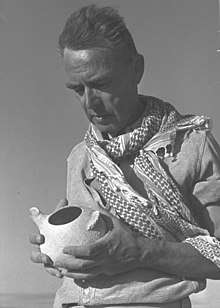Nelson Glueck
Nelson Glueck (June 4, 1900 – February 12, 1971) was an American rabbi, academic and archaeologist. He served as president of Hebrew Union College from 1947 until his death, and his pioneering work in biblical archaeology resulted in the discovery of 1,500 ancient sites.
Rabbi Nelson Glueck | |
|---|---|
 Nelson Glueck in Israel, 1956 | |
| Born | June 4, 1900 Cincinnati, Ohio |
| Died | February 12, 1971 (aged 70) Cincinnati, Ohio |
| Nationality | |
| Education | Ph.D. in biblical studies, University of Jena, Germany, 1926 or 1927 B.A., University of Cincinnati, 1920 B.H.L., Hebrew Union College, 1918 |
| Occupation | Rabbi, archaeologist |
| Title | President, Hebrew Union College - Jewish Institute of Religion |
| Term | 1948-1971 |
| Spouse(s) | Helen Iglauer (hematologist), March 26, 1931 |
| Children | Charles Jonathan Glueck |
| Parent(s) | Morris Glueck, a merchant, and Anna Rubin |
| Notes | |
Biography
Born in Cincinnati, Ohio in 1900 to Lithuanian Jewish[4] parents, Glueck developed a passion for religion early in life, and was ordained as a Reform rabbi in 1923. He received his Ph.D from the University of Jena in Germany in 1926. By 1928 he was a member of the Hebrew Union College faculty, teaching at the seminary of the Reform Jewish movement. It was during this time period that he first visited the Holy Land. Over his career, he developed an intimate knowledge of the land's rich history. As an expert on ancient pottery, he was able to match small ceramic fragments to distinct time periods. He was the first to identify some ancient wares such as the Edomite and Midianite pottery, re-discovered what is now called Negevite pottery, and[5] surveyed many unknown sites in the Transjordan.
During World War II, Glueck used his intimate knowledge of Palestine's geography to help the Office of Strategic Services develop a contingency plan for a retreat from German field marshal Rommel's advance through Northern Africa. Rommel was stopped, however, and the plan was not needed.
In the 1950s, Glueck discovered remains of the advanced Nabataean civilization in Jordan. Using irrigation, the Nabataeans were able to grow crops and develop a densely populated civilization in the Negev desert, despite receiving under 6 inches (15 cm) of rainfall a year. Glueck worked with Israeli leaders to build an irrigation system modeled on that of the Nabataeans.
Glueck's scholarship led to personal relationships with many world leaders: he delivered the benediction at President John F. Kennedy's inauguration in 1961; and he was personal friends with many of the State of Israel's early leaders, including David Ben-Gurion, Abba Eban, Golda Meir, Henrietta Szold and Judah Magnes.
He was the author of several books on archaeology, religion, and the intersection of the two. They include Explorations in Eastern Palestine (4 vol., 1934–51), The Other Side of the Jordan (1940), The River Jordan (1946), Rivers in the Desert: A History of the Negev (1959), Deities and Dolphins (1965), and Hesed in the Bible (1968)...Even though he worked to develop a historical understanding of biblical events and argued that the archaeological finds do affirm the biblical descriptions,[6] he always maintained that his faith was not based on a literal interpretation of the bible. To do that, he once said, would be to "confuse fact with faith, history with holiness, science with religion."
He died in Cincinnati in 1971, after having previously announced plans to step down from the HUC presidency the following year, and just four months after his final trip to Israel. He was succeeded as president of HUC by Rabbi Alfred Gottschalk.[7]
The Nelson Glueck School of Biblical Archaeology at the Hebrew Union College is named after him.
See also
References
- Contemporary Authors Online, Gale, 2009. Reproduced in Biography Resource Center. Farmington Hills, Mich.: Gale, 2009. http://galenet.galegroup.com/servlet/BioRC Retrieved February 17, 2008. Fee. (Fairfax County Public Library) Document Number: H1000037283
- "Nelson Glueck."Dictionary of American Biography, Supplement 9: 1971-1975. Charles Scribner's Sons, 1994. Reproduced in Biography Resource Center. Farmington Hills, Mich.: Gale, 2009. http://galenet.galegroup.com/servlet/BioRC Retrieved February 17, 2008. Fee. (Fairfax County Public Library) Document Number:
-
Goldmark, Lawrence (March 20, 2008). "Obituaries: Rabbi David Lieb, Leader of Temple Beth El for 30 Years, Dies at 65". The Jewish Journal. Archived from the original on October 10, 2012. Retrieved February 18, 2009.
...the late archaeologist Dr. Nelson Glueck, who was married to Dr. Helen Glueck, a renowned hematologist.
- Jonathan M. Brown and Lawrence Kutler, Nelson Glueck: Biblical Archaeologist and President of Hebrew Union College-Jewish Institute of Religion. Cincinnati: HUC Press, 2005, p. 21.
- SAUER, JAMES A.; HERR, LARRY G. (1997). "TRANSJORDAN: Transjordan in the Bronze and Iron Ages". The Oxford Encyclopedia of Archaeology in the Near East. p. 231. ISBN 0195112156.
- Glueck, Nelson (1959). Rivers in the Desert. New York: Farrar, Strous and Cudahy. p. 136.
It may be stated categorically that no archaeological discovery has ever controverted a Biblical reference. Scores of archaeological findings have been made which confirm in clear outline or exact detail historical statements in the Bible. And, by the same token, proper evaluation of Biblical descriptions has often led to amazing discoveries.
- Alfred Gottschalk Archived May 27, 2010, at the Wayback Machine, Hebrew Union College. Accessed September 21, 2009.
Further reading
- Nelson Glueck: Biblical Archaeologist and President of Hebrew Union College-Jewish Institute of Religion, Jonathan M. Brown, Laurence Kutler, Hebrew Union College Press, 2006
External links
- Article in Time Magazine, December 13, 1963
- Nelson Glueck School of Biblical Archaeology